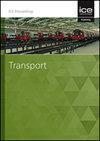智能验轨列车能量最优控制:设计与实验
IF 1
4区 工程技术
Q4 ENGINEERING, CIVIL
Proceedings of the Institution of Civil Engineers-Transport
Pub Date : 2023-06-27
DOI:10.1680/jtran.22.00077
引用次数: 0
摘要
提出了一种新的智能轨道检测列车节能控制策略,并对其有效性进行了评价。本文介绍了一个足够简单的实际ITIT状态空间模型。利用该模型制定并求解约束优化问题,利用伪谱法确定车辆的最优速度剖面,以实现最大的节能。然后使用模型预测控制(MPC)方案创建控制器,使其尽可能地遵循所得到的最优速度轨迹。在Amesim软件中建立的ITIT高保真模型与Matlab/Simulink软件环境中开发的MPC方案联合仿真结果表明,MPC方案应用于车辆高保真模型时,可以很好地跟踪到最优速度轨迹。在联合模拟过程中,基于mpc的最优速度轨迹的电池荷电状态(SOC)变化的能耗比传统的非最优巡航控制器低6%左右。此外,在一个真实的ITIT实验中,非最优巡航控制器在SOC变化方面的能耗比基于mpc的最优速度轨迹跟踪多5%。本文章由计算机程序翻译,如有差异,请以英文原文为准。
Energy-optimal control of intelligent track inspection trains: design and experiment
A new energy-efficient control strategy for intelligent track inspection trains (ITITs) was developed and its effectiveness evaluated. A sufficiently simple state-space model for a real ITIT is introduced in this paper. This model was used to formulate and solve a constrained optimisation problem to determine the vehicle's optimal speed profile using the pseudo-spectral method to achieve the highest energy savings. A model predictive control (MPC) scheme was then used to create a controller to follow the resulting optimal speed trajectory as closely as possible. The results obtained from co-simulation between a high-fidelity model of the ITIT built within the Amesim software program and the MPC scheme developed in the Matlab/Simulink software environment showed that the optimal speed trajectory was tracked very well when the MPC scheme was applied to the vehicle's high-fidelity model. During the co-simulations, the energy consumption in terms of the battery's state of charge (SOC) changes for the MPC-based optimal speed trajectory following was around 6% less than that for a conventional non-optimal cruise controller. Moreover, in an experiment with a real ITIT, the energy consumption in terms of the SOC changes for the non-optimal cruise controller was 5% more than that for the MPC-based optimal speed trajectory following.
求助全文
通过发布文献求助,成功后即可免费获取论文全文。
去求助
来源期刊
CiteScore
2.60
自引率
0.00%
发文量
42
审稿时长
5 months
期刊介绍:
Transport is essential reading for those needing information on civil engineering developments across all areas of transport. This journal covers all aspects of planning, design, construction, maintenance and project management for the movement of goods and people.
Specific topics covered include: transport planning and policy, construction of infrastructure projects, traffic management, airports and highway pavement maintenance and performance and the economic and environmental aspects of urban and inter-urban transportation systems.

 求助内容:
求助内容: 应助结果提醒方式:
应助结果提醒方式:


